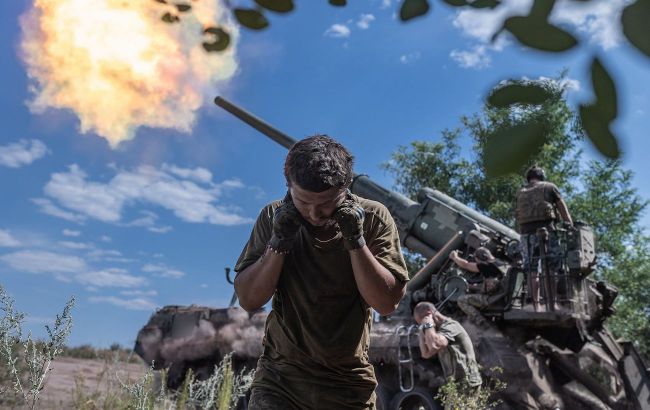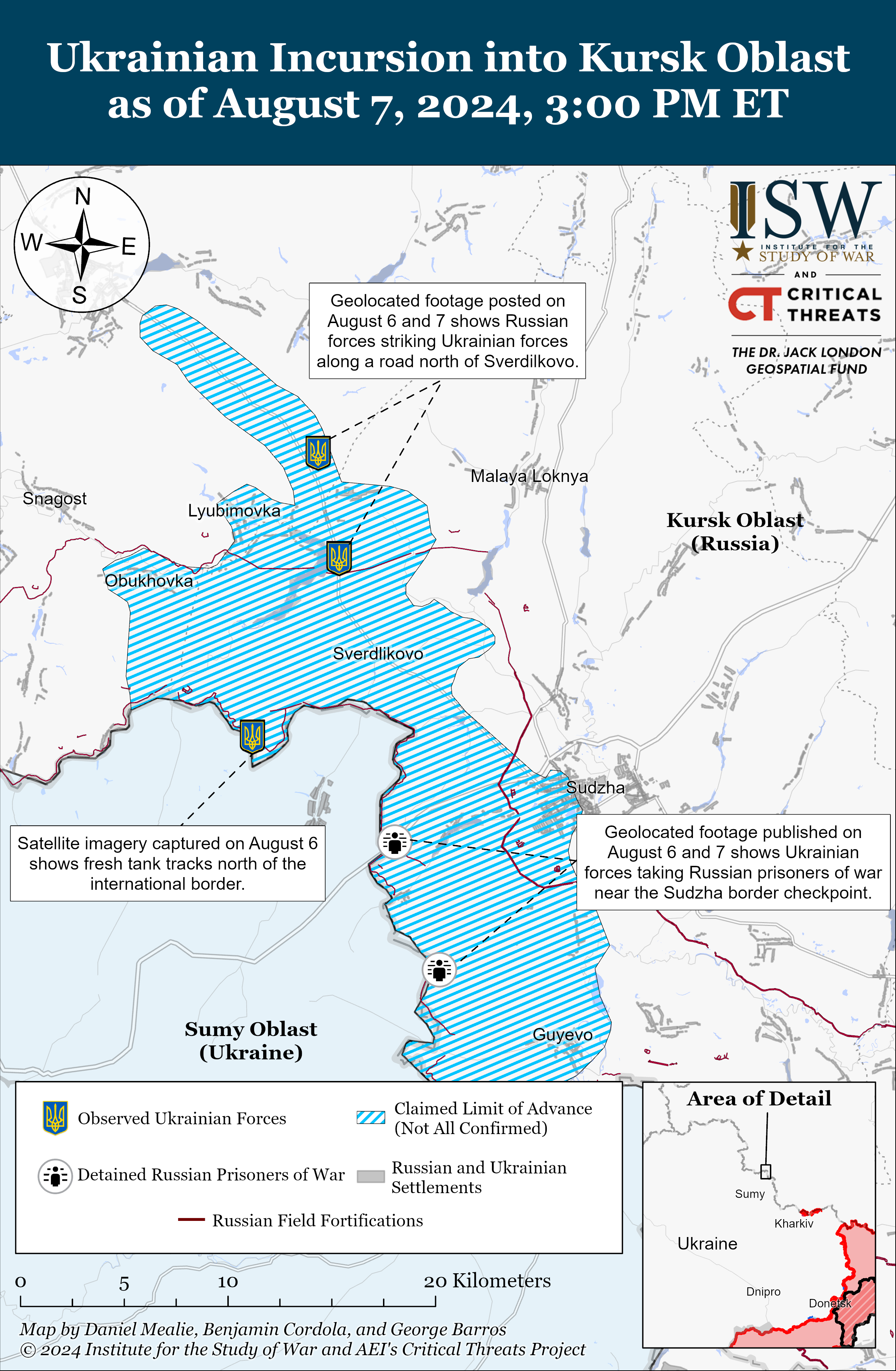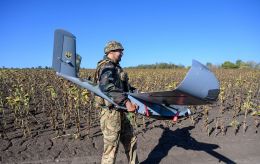How 'Kursk breakthrough' could boost Ukraine power for negotiations
 Ukrainian troops are likely fighting for the third day in Russia (photo: Getty Images)
Ukrainian troops are likely fighting for the third day in Russia (photo: Getty Images)
The limited military operation in the Kursk region of Russia continues for the third day. According to unconfirmed reports, Russia has lost control of a number of its settlements, while the Ukrainian side is still silent. What the "Kursk breakthrough" might mean and whether it will bring peace talks and the end of the war closer - read below.
Contents
- Three days of operation in Kursk region: Highlights
- What border breach means in Russia-Ukraine war context
- Did Putin fail the test?
- Whether this breakthrough will strengthen Ukraine's position in negotiations
Three days of operation in Kursk region: Highlights
Fighting in the border areas of the Kursk region has been going on since August 6. The Ukrainian side has not officially reported any breakthroughs into the Sudzhansky and Korenevsky districts, but according to media reports and Russian Z-military propagandists, a so-called Kursk bridgehead is being "under construction."
Ukrainian forces are probably trying to act in the style of the Kharkiv offensive in the fall of 2022. Assault and sabotage groups are acting along the roads to disorganize the Russian rear and prevent the approach of enemy reserves.
In the first two days, Russia could have lost control over an area of 350 square kilometers. This includes the Sudzha checkpoint on the border with Ukraine's Sumy region, a gas metering station, the western part of Sudzha, and several settlements. Supposedly, fighting is also taking place in the direction of Rylsk, and advanced units could have reached the outskirts of Korenev, another district center 25 kilometers from Ukraine.
According to the map from the Institute for the Study of War (ISW), the breakthrough is at least 10 km deep. Citing geolocated footage, analysts say that two defense lines have been overcome. There is information about the capture of several dozen Russian soldiers.

Map of the Kursk breakthrough by the Institute for the Study of War (photo by understandingwar.org)
Everything indicates that the enemy was not prepared for such a turn. One of the units of the 58th combined arms army (based in Chechnya) has been deployed directly in the Sudzhansky district, with border troops and infantry, partly consisting of conscripts. There are reports of heavy losses in Chechen units.
According to Telegram reports, the offensive is supported by armored vehicles and under the cover of air defense. The fact that Ukrainian troops have indeed reinforced air defense is evidenced by the fact that the Defense Forces shot down a ballistic missile and a helicopter in the Sumy region on August 6. RBC-Ukraine sources in the Security Service confirmed that a Russian Mi-28 helicopter was shot down by an FPV drone in the sky over the Kursk region.
The General Staff of the Armed Forces of Ukraine reported in the morning that the Russians had lost a helicopter in the previous days. But without specifying the location. The operation, which the media call the largest foray into Russian territory, is taking place in total silence from the Ukrainian side.
Meanwhile, Western partners seem to have nothing against it. As the European Commission emphasized, Ukraine has every right to defend itself, including by striking the aggressor on its territory. “We have to remember that — obviously, in this region (Kursk region - ed.), that there’s Russian troops there. They are in a region of Russia. And they’re in that region attacking Ukraine. And so, we can’t forget that,” the White House spokeswoman Karine Jean-Pierre said.
What border breach means in Russia-Ukraine war context
The fact that Russia cannot drive “unknown forces” from its territory is not just a demonstration of Ukraine's military capabilities. It is already clear that a carefully planned and well-prepared operation is underway in the Kursk region, explains Oleksandr Musiienko, head of the Center of Military Law Researches.
According to him, no leaks and deliberate disinformation of the enemy through the media provided the effect of surprise. And such actions can be both of military and political importance.
“Speaking about the military, firstly, measures are being taken against the shelling of the Sumy region and enemy subversive reconnaissance groups. Secondly, the implementation of counter-offensive actions disorients the enemy, diverts forces and attention from the main direction in eastern Ukraine. Thirdly, of course, the destruction of manpower and equipment, which will be replenished from the reserves that were supposed to be transferred to the east,” the source said.
As for the political effect, this is a demonstration for skeptics who doubt Ukraine's ability to seize the initiative. “To put it mildly, this is not entirely true. I think it is also a step towards a stronger position at the next peace summit. In fact, Ukraine is showing that it can put forward its own conditions, put the Russians in an uncomfortable situation when there is no other way but to make concessions,” the expert added.
It is important for Ukraine to show that the war can indeed spill over onto Russian territory. And it will not have catastrophic consequences. It is important to influence the assessments of Western partners, who are still afraid of escalation, says Volodymyr Fesenko, head of the Penta Center for Applied Political Studies.
The position of the United States and the European Union is very telling here. The partners did not speak out immediately but said that Ukraine had every right to defend itself this way.
“This can also be viewed as a political result. This is important for preparing our allies for the decision to at least partially lift restrictions on using weapons to strike Russia. Before that, we were informally advised not to cross the border. And now, I would say, we are removing the psychological barrier,” the political scientist said.
In his opinion, one should not see the breakthrough as a humiliating slap in the face to Vladimir Putin, but as a sign that it is time to get Russians used to the fact that the war can be on their territory. And for the West to get used to it as well.
Another effect concerns Ukrainians themselves. Local actions in the Kursk region are important politically and socio-psychologically. It is important to break the black streak of despair from the frontline news, to show that the Defense Forces can not only retreat but also advance.
“These events remind me of the operation in the Kharkiv region in 2022. This is the style of Oleksandr Syrskyi (the head of the Armed Forces - ed.). We see that he can act outside the box, and this is an important tone for us to understand that we can and must withstand,” Fesenko said.
Did Putin fail the test?
The reaction of the Russian leadership is also indicative. Putin reacted a day later, claiming a provocation and accusing Ukrainian troops of allegedly indiscriminate shelling. He also ordered “immediate measures” to be taken. Chief of the General Staff Valery Gerasimov was quick to assure that the breakthrough had been stopped. There were reports of reinforcements being sent to the Sudzhansky district, which most likely had not yet entered the battle.
The situation in the Kursk region has become a test for Russian defense and authorities. They remained silent for some time, and the Kremlin's reaction was clearly delayed. It caused a flurry of panic and hysteria on social media. There were calls for a declaration of war, but Putin was afraid to escalate.
According to Fesenko, the Russian leader understands that the word “war” will negatively affect the mood in society. For this reason, there is no mass mobilization. Putin does not want to burn all bridges and knows that if he escalates the situation, the risks of a direct conflict with the West will increase enormously.
“It seems to me that he is still sticking to negotiating as the main scenario to end the war. He cannot win the war, but he wants to end it on his own terms. That's why he spoke with restraint, and it's good for us. In terms of how the West will perceive it. Like, you see, you were afraid and held us back, but Putin has his own fears. He has been escalating for a long time, and there is no need to be afraid of non-standard strikes against Russia,” he said.
Oleksandr Musiienko agrees: the breakthrough showed that Russian threats remain only threats. When a direct threat to Russia arose, Putin worried, convened the Security Council, gave orders - to strengthen the border - and received a promise that “the enemy will be defeated.”
The panic and gaps in communication, are simply explained, the expert believes. Today, the Kremlin is not ready to honestly tell ordinary Russians why all this is happening.
“Putin will have to come out and explain why so many drones and missiles have started to hit, why the war has come to their territory. The reason is that Putin started the war and these are the consequences of the war. Who is to blame? If you start talking about this, you can expose yourself. Of course, the Kremlin does not want to increase sentiment against itself,” the expert explained.
Whether this breakthrough will strengthen Ukraine's position in negotiations
Amid talks about the need to move toward ending the war, Ukraine emphasizes that it is necessary to enter peace talks in a strong position. RBC-Ukraine's experts are inclined to believe that the events in the Kursk region may be an element of such tactics.
Such actions inspire admiration and respect and have a positive impact on the country's image abroad. Accordingly, it forms a better negotiating position, Oleksandr Musiienko is convinced.
But since the operation is ongoing, it is difficult to say whether it will affect the opinion of partners, other participants in the upcoming peace summit, and, for example, China, which President Volodymyr Zelenskyy wants to see not as a mediator but as a player capable of putting pressure on Moscow.
Political scientist Volodymyr Fesenko is convinced that we should not expect Beijing to become more favorable to Ukraine. It perceives the war in the context of the confrontation with the United States and has much in common with Russia's perception. In other words, neither Ukraine's victory nor Russia's complete victory is beneficial to China.
“According to my information, China - and not only China - sees this operation as something that can strengthen Ukraine's position. How and to what extent? It depends on how the situation develops. But before the events in the Kursk region, the unequivocal diagnosis was that we were weak (because the Russians were advancing), now our position is partially beginning to strengthen,” Fesenko said.
What is clear is that the Ukrainian side demonstrates the ability to change the military situation. And symbolic gains in the Kursk region can be a strong card in negotiations.
“I'm sorry for the cynicism, but even if we don't manage to go further, the foothold we have can be used for an exchange in the future. For example, the Russians are withdrawing from the north of the Kharkiv region, and we are returning to the border. This is already being discussed in diplomatic circles. But, in my opinion, it is too early to say whether the events in the Kursk region will push Russia to negotiate not only on its terms. It's still a long way from negotiations,” he concluded.
Mykhailo Podolyak, an adviser to the head of the Presidential Office, suggested that these events could affect the future negotiation process. At least, for the Russian leadership to finally realize that the war is not going according to Russia's scenario.
Sources: information from Telegram channels, the Institute for the Study of War (ISW), and comments by military expert Oleksandr Musiienko and political scientist Volodymyr Fesenko.

